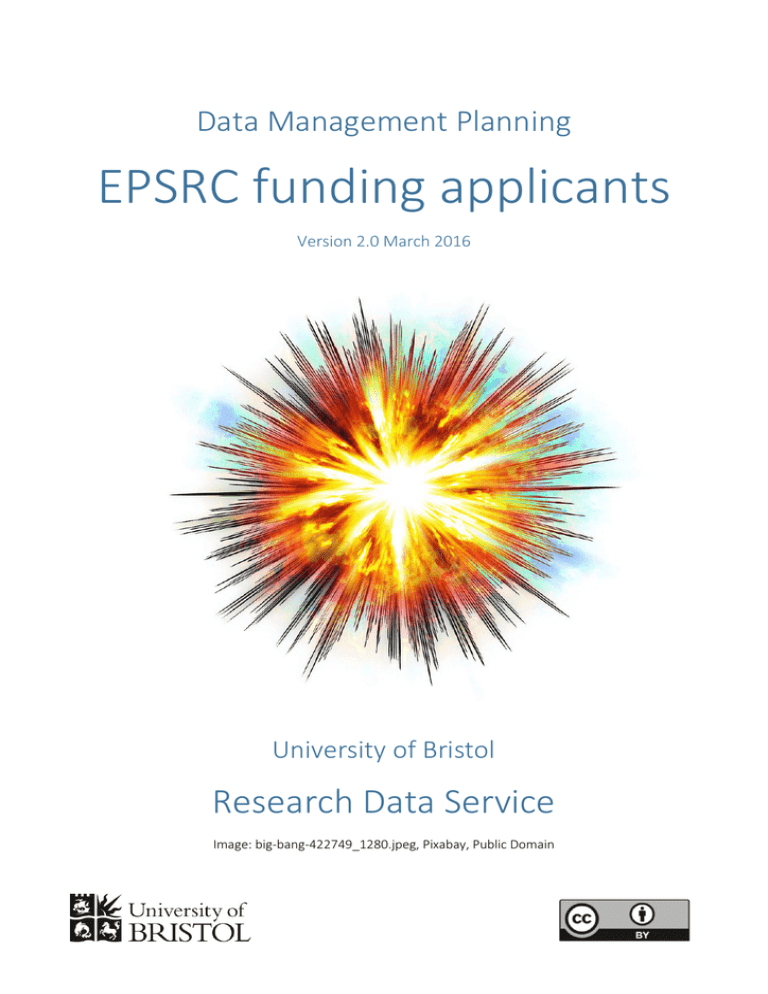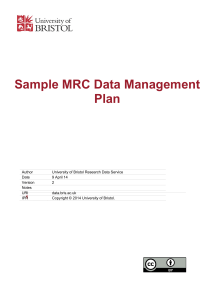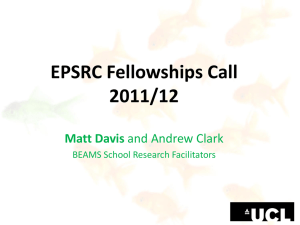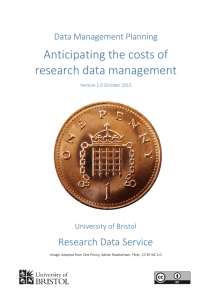EPSRC funding applicants Research Data Service Data Management Planning
advertisement

Data Management Planning EPSRC funding applicants Version 2.0 March 2016 University of Bristol Research Data Service Image: big-bang-422749_1280.jpeg, Pixabay, Public Domain expires and be effectively curated throughout its SUMMARY lifecycle. st On May 1 , 2015, the EPSRC changed its grant requirements. Both the University and the researchers The Research Data Service has published a summary; are now required to adhere to a set of expectations1 please refer to ‘Brief guidelines to meeting EPSRC Data with regards to research data management. Management Expectations’2 on our website. Expectations of particular note: INTRODUCTION The EPSRC does not require a data management plan to be submitted with a grant application. This document outlines the expectations from the However, the University does require the EPSRC concerning the management and provision of completion of a short online form as part of the access to research data and what EPSRC-funded fEC system, which asks you to consider data researchers will need to do in order to comply with management issues. those expectations. If there are potential costs in storing and/or managing your research data, these will need to Unlike other funding bodies, the EPSRC does not be highlighted in the costs of your grant. require a data management plan to be submitted with Researchers should comply with the University’s a grant application. However, you will still need to policies and procedures concerning research consider how your research data will be managed data. when applying for funding. If there are potential costs Published research papers should include a short in storing and/or managing your research data, these statement describing how and on what terms any will need to be highlighted in the costs of your grant. supporting research data may be accessed. The University requires the completion of a short Metadata describing your research data should online form demonstrating you have considered the be published within 12 months of the data being costs and responsibilities associated with research generated and include a DOI (Digital Object data management as part of the fEC process for EPSRC Identifier). grants.3 Where access to the data needs to be restricted, Definitions provide justification in the published metadata. Research data needs to be securely preserved for Research data are data, or units of information, that 10 years after any privileged access period are created in the course of funded or unfunded 1 3 EPSRC Expectations https://www.epsrc.ac.uk/about/standards/researchdata/ expectations/ 2 data.bris.ac.uk/files/2016/02/EPSRC-expectationsbrief.pdf fEC Project Costing Home https://www.bris.ac.uk/research/funding/project_costing /Welcome.jsa 2 research, and often arranged or formatted in such a providing an environment that recognises and way as to make them suitable for communication, supports research excellence, and has developed a interpretation, and processing, perhaps by a policy4 that highlights the responsibilities of the computer. Examples of research data include a University and its researchers. spreadsheet of statistics, magnetic field data, a The EPSRC expects all its funded researchers or collection of digital images, or remote sensing data. research students to comply with the University’s Research data does not include data generated in the policies and processes concerning research data course of personal activities, desktop or mailbox holdings. All research undertaken at the University backups, or data produced by non-research activities must comply with relevant legislation, including such as university administration and teaching. copyright, ethical and legal requirements. A list of all Note that in the context of the EPSRC Policy University policies relevant to research data can be Framework, research data is not defined as every found in Appendix A of this document. piece of data produced during a project. The EPSRC Access to underlying data has indicated it expects the data that underpins published research outputs to be kept as a priority. In accordance with RCUK’s Policy on Open Access and However, researchers themselves should decide what Guidance,5 the EPSRC requests that published papers should and what should not be kept, in the first (resulting from funded research) should include a instance. short statement explaining how and on what terms the underlying data can be accessed. EPSRC expectations The most straightforward way to make your data The EPSRC has nine research data management accessible is to publish it through a repository. Sharing expectations for organisations that are in receipt of via an appropriate, established repository is usually EPSRC funding. These in turn affect the way individual expected in subject areas where such repositories researchers should manage and share their research exist. The University of Bristol has its own research data. These expectations can be grouped around a data repository6 which researchers from any discipline number of key themes. may wish to use. This repository can provide ongoing access to research data for a minimum of 20 years. Awareness of Bristol University policies and processes concerning research data The University is committed to supporting its researchers in meeting the EPSRC’s expectations by 4 University of Bristol. Research Data Management Principles, data.bris.ac.uk/rdm-policy/ 5 RCUK Policy on Open Access and Guidance www.rcuk.ac.uk/RCUK- prod/assets/documents/documents/RCUKOpenAccessPol icy.pdf 6 data.bris Research Data Repository data.bris.ac.uk/data/ 3 Contact the Research Data Service7 as early as possible defined metadata schema) through which researchers if you believe you’ll need to make use of Bristol’s can submit their metadata in 2016. data.bris Research Data Repository. When documenting your data during the course of As part of the process of depositing your research data your research, it is generally best to use established and making it publicly accessible, the data.bris and shared metadata standards, rather than create repository service automatically assigns a DOI (Digital new ones, as this helps with consistency and saves Object Identifier) to your data, which can be used for effort. The DCC have a useful list of metadata citation purposes and for associating the dataset with standards for specific disciplines.9 other research outputs. It is recommended that the While the re-use and sharing of data is very much authors of published academic papers do not provide encouraged, it is recognised that there may be legal, their own current contact details as a means by which ethical and commercial constraints on the release of underlying research data may be accessed, as these particular research data that make it unsuitable for details are likely to change over time. Guidance on sharing. It may be that restricted parts of your data citing your research data is available at the Research cannot be shared, but the remainder can. The EPSRC Data Service website.8 will expect you to provide justification for limiting access and an explanation of how, and by whom this Metadata restricted access will be managed. Metadata is 'data about data' or 'cataloguing information' that enables data to be found, Storage and preservation understood and re-used where necessary. There are It is expected that research data from any EPSRC- various other pieces of information that it is useful to funded project will be preserved in a secure manner record; bear in mind that the metadata must be for at least 10 years, either after the expiry of any sufficient to allow others to understand what research privileged access period agreed by the EPSRC or, if data exists, why, when, and how it was generated, and others have accessed the data, from the last date on how to access it. which access to the data was requested by a third The EPSRC requests that metadata describing research party. data holdings is published by the University within 12 If you are not part of a study with existing data storage months of the data being generated, and that arrangements, it is recommended that when you metadata for digital data should include a DOI. The create data you store it in the University’s Research University will be providing a mechanism (including a Data Storage Facility (RDSF) managed by the Advanced 7 9 The University of Bristol’s Research Data Service data.bris.ac.uk 8 data.bris.ac.uk/files/2014/02/Citing-research-data.pdf DCC Disciplinary Metadata Standards www.dcc.ac.uk/resources/metadata-standards 4 Computing Research Centre.10 Each research staff Guidance for non-digital data is available at the member is entitled to 5TB of secure data storage Research Data Service website.12 without charge. If your storage quota is already used The EPSRC expects the research data it funds to be up, or if your project will exceed this storage limit, correctly curated throughout its lifecycle. The there will be a cost and the ACRC should be contacted University recognises that numerous stakeholders will for guidance before your budget is finalised. The back- be involved during the data curation lifecycle, and up procedures, policies and controlled access researchers may be involved at several stages. In order arrangements used by the RDSF are of a very high to support these activities, it is worth thinking about standard, and data is stored for a minimum of 20 your own data over the longer term, how it is created, years. Full details of how to apply for data storage are the file formats you are using, and how well suited available on the University’s website.11 these are to long-term preservation. If you choose not to store your EPSRC-funded data in the RDSF or in another UK-based data centre, you will need to ensure that it is not held somewhere where the legal safeguards are lower than in the UK, this is especially important if you are planning to use a cloud storage provider as the storage may be governed by a different legal jurisdiction. You should also consider how you will keep your data safe before it’s deposited in a storage facility such as the RDSF. This is particularly important if you are conducting field research. As a minimum requirement, try to ensure that at least two copies of the data exist and that every copy can easily be accounted for and located if required. Any significant EPSRC-funded, physical samples or collections, particularly those which underpin a research claim, should also be stored appropriately for a minimum of ten years after a project has concluded. 10 12 Advanced Computing Research Centre, University of Bristol, www.acrc.bris.ac.uk 11 www.acrc.bris.ac.uk/acrc/storage_application.htm https://data.bris.ac.uk/files/2016/02/EPSRC-nondigital.pdf 5 APPENDIX A – BRISTOL UNIVERSITY POLICIES AND GUIDANCE Commercial contracts - Contracts Team in Research Policies Information Security www.bristol.ac.uk/infosec/ Ethics Policy and Procedure Research data management issues www.bris.ac.uk/red/research-governance/practice- data.bris.ac.uk/research and Enterprise Development (RED) www.bris.ac.uk/red/contracts/ training/researchethicspolicy.pdf - governs the ethics of research across the University as a whole. Research Governance and Integrity Policy www.bristol.ac.uk/red/research-governance/practicetraining/rgi.pdf - requires that all research data should be retained for suitable periods, in line with relevant laws and conditions imposed by research funders. Information Security Policy documents www.bristol.ac.uk/infosec/policies/docs/ - series of policies covering information access and security Advice and guidance Data Protection Act - University Secretary’s Office www.bristol.ac.uk/secretary/dataprotection/ Freedom of Information Act www.bristol.ac.uk/foi/staffinfo/ Ethical issues: Faculty Ethics Officers www.bris.ac.uk/red/researchgovernance/ethics/uni-ethics/index.html Research Governance Team (for projects involving human participants and their tissue or data) www.bristol.ac.uk/red/research-governance/ 6






